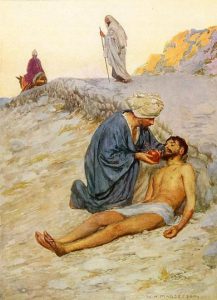(This is part of my recent series on the Gates of Hell.)
As we confront today’s child-killing Gates of Hell under the power and promise of Christ, we labor alongside others whose definition of Christianity looks different from our own. Some of our friends have become very offended at what they consider to be idolatrous prayers and practices of some of our co-laborers.

A Samaritan rescues an injured man who had been shunned by a priest and Levite.
If the Church is to faithfully confront the Gates of Hell, we must indeed first be sure to properly (and fully) identify these gates. Ignoring one gate while confronting all others is likely to prove to be futile in the long run.
Jewish leaders did not limit the concept of the Gates of Hell to Gehenna; the burning of children there only provided the most obvious, disgraceful example. Idolatry and false religions were represented in Scripture as snares which led the nation of Israel on the pathway to child sacrifice (Psalm 106:36-39), along with sexual perversions (Ezekiel 16 and Ezekiel 23).
Continue reading →

 When God heard the cries of the oppressed Israelites in Egypt, He raised up Moses to deliver His message “let My people go” to Pharaoh, the Egyptian ruler (Exodus 3:7-10). Pharaoh’s stubborn refusal to submit to Moses’ demands brought a series of divine plagues upon Egypt, finally resulting in the destruction of Pharaoh and his army in the Red Sea (moments after Moses and the Israelites had miraculously crossed over on dry land).
When God heard the cries of the oppressed Israelites in Egypt, He raised up Moses to deliver His message “let My people go” to Pharaoh, the Egyptian ruler (Exodus 3:7-10). Pharaoh’s stubborn refusal to submit to Moses’ demands brought a series of divine plagues upon Egypt, finally resulting in the destruction of Pharaoh and his army in the Red Sea (moments after Moses and the Israelites had miraculously crossed over on dry land). For most of my life, the topic of Calvinism was not much of a concern to me. The arrogance of a Calvinist friend in High School had little influence on me, and certainly seemed to me not to be something I could attribute to God’s “glory.” Calvinist
For most of my life, the topic of Calvinism was not much of a concern to me. The arrogance of a Calvinist friend in High School had little influence on me, and certainly seemed to me not to be something I could attribute to God’s “glory.” Calvinist